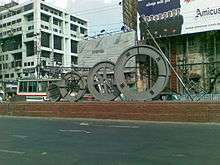Abbasuddin Ahmed
| Abbasuddin Ahmed | |
|---|---|
 | |
| Background information | |
| Born |
27 October 1901 Tufanganj, Cooch Behar, British India |
| Died |
30 December 1959 (aged 58)[1] East Pakistan |
| Genres | Bhawaiya (folk) |
| Occupation(s) | singer, composer |
Abbasuddin Ahmed (27 October 1901 – 30 December 1959) was a Bengali folk song composer and singer born in the Bengal province of British India. He was known for Bhawaiya folk song which is a style commonly found in Rangpur and Cooch Behar.
Early life
Ahmed was born in Tufanganj subdivision of Cooch Behar district (now in India). His father, Zafar Ali Ahmed, was a lawyer at Tufanganj court.[2] His early education was from schools and a college of North Bengal. He came closer to music through the cultural programme at schools and colleges. He was largely a self-taught song composer and singer. For a brief period he learnt music from Ustad Jamiruddin Khan in Kolkata.
Career
Ahmed started singing Bhawaiya, Ksirol and Chatka which were famous in Cooch Behar and Rangpur. Later he started to sing other folk songs like jaari, sari, bhatiyali, murshidi, bichchhedi (songs of estrangement), marsiya, dehatattwa, and pala gaan. He also collaborated with Kazi Nazrul Islam, Jasimuddin and Golam Mostafa.[3]
Awards
- Pride of Performance (1960)
- Shilpakala Academy Award (1979)
- Independence Day Award (1981)
Legacy

Ahmed's daughter, Ferdausi Rahman, his youngest son, Mustafa Zaman Abbasi, and his granddaughter, Nashid Kamal, are also notable singers.[4]
References
- ↑ "আব্বাস উদ্দিনের গান". Prothom Alo. 2012-12-27. Retrieved 2012-12-27.
- ↑ "Abbasuddin birth anniversary celebrated". The Daily Star. 29 October 2011. Retrieved 24 December 2012.
- ↑ "Old is better than gold". Creative Bangladesh. Retrieved 28 October 2013.
- ↑ Wakil Ahmed. "Ahmed, Abbasuddin". Banglapedia: The National Encyclopedia of Bangladesh, Asiatic Society of Bangladesh, Dhaka. Retrieved June 9, 2015.